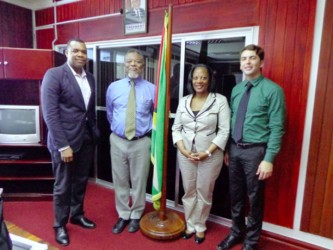Data compiled during an International Press Institute (IPI) visit here in April lends weight to accusations of discrimination by the government in the distribution of official advertising, the press body has said.
“An IPI review of state advertising patterns in Guyana reveals extreme inequalities in the way such advertising is distributed… the state-owned Chronicle and the PPP-affiliated Mirror receive more than four times as much state advertising space as the so-called “opposition” papers Stabroek News and Kaieteur News,” the IPI said in its report which was released on Monday.

In April, the Vienna, Austria-based press freedom group together with its strategic partner, the Association of Caribbean Media Workers (ACM), conducted a three-week mission to six Caribbean countries: Antigua and Barbuda, Guyana, Suriname, the Dominican Republic, Trinidad and Tobago, and Curaçao. The mission took place under the umbrella of IPI’s flagship campaign to repeal criminal defamation in the Caribbean and was designed to follow-up on the success of IPI’s first mission to the region, in June 2012. The aim of IPI’s campaign is to encourage government officials in the Caribbean to repeal outdated laws that criminally punish defamation, which includes, for IPI’s purposes, libel, seditious libel, contempt of authority, and insult, both of individuals and of the state itself.
Among the concerns raised here was the distribution of state advertising and the mission gathered data which showed that on Sunday 5th May, the state-owned Guyana Chronicle got 1456 column inches in state ads, the PPP’s Mirror- 697, Guyana Times- 213, Stabroek News- 147 and Kaieteur News 51.
On May 12, the figures for state ads were Chronicle – 2383, the Mirror – 814, Guyana Times – 735, Stabroek News- 652 and Kaieteur News -195. On May 19, the figures were Chronicle-2392, the Mirror-944, Guyana Times 320, Stabroek News-195 and Kaieteur News-195. On May 26, the figures were Chronicle-2166, Mirror-792, Guyana Times-313, Stabroek News-153 and Kaieteur News-211.
Over the four days the total figures were Chronicle- 8397, Mirror – 3247, Guyana Times – 1581, Stabroek News- 1147 and Kaieteur News – 664 column inches of state ads.
“As shown, these figures do not correlate with circulation numbers: the Chronicle has (according to its own estimate) one-half of Kaieteur News’s readership, yet receives on average 12 times as much state advertising. Such data certainly lend weight to accusations of deliberate discrimination in the distribution of official advertising, in order to punish certain newspapers for expressing their opinions. Speaking about the Chronicle and the Mirror, one editor said state advertising was a “back door subsidy because their circulation is low and they don’t attract many ads from the private sector,” the report said.
Meantime, the report said that though Guyana boasts a vibrant private press, the state media continues to be a powerful force. The state owns the National Communications Network and the Guyana Chronicle.
“Unfortunately, the state media are widely viewed as propaganda vehicles for the government and appear to be frequently abused in order to attack the political opposition,” the IPI said.
It referred to an APNU document, ‘The Executive War on the Legislative Branch’ which contained nearly 100 examples of GINA press releases during 2012 that APNU claims constituted deliberately biased and/or inflammatory attacks on itself and the AFC.
“An IPI review of the document confirmed that the releases contained demeaning language that seemed intended to belittle the opposition rather than inform the Guyanese people in a balanced manner,” the report said.
“Moreover, while government ministers and MPs were frequently quoted—usually as attacking the opposition—the views of APNU and AFC were virtually never included, despite the fact that the releases in question primarily concerned actions of the opposition,” the report added.
It said that as a politically neutral organisation, IPI takes no position on the views or positions of a particular party; however, it strongly believes that state and public media should represent the views of all political actors in a fair and balanced manner. It noted too that in interior regions the state media is the only source of information.
The report also noted that during its visit, IPI also learned that certain private media that report critically on the government are publicly referred to and/or demeaned as the “opposition press.”
It added that the Guyanese press, particularly the independent press, has on numerous occasions been the victim of direct acts of intimidation, although the situation has improved slightly since Donald Ramotar took over the presidency from Bharrat Jagdeo. Jagdeo had, among various incidents, referred to journalists as “carrion crows” and “vultures”; compared certain Guyanese media to media in Rwanda that had allegedly instigated that country’s 1994 genocide; and banned current GPA president Gordon Moseley, then a reporter for Capitol News, from the Office of the President, the IPI noted.
In relation to Freedom of information, the report noted that a FOI Act was passed in September 2011 and while it absolutely constitutes a positive step toward increased transparency, several deficiencies were noted. “Most prominently, it does not apply to the president, a commission of inquiry issued by the president, or a “public authority or function of a public authority as the president may, by order, subject to negative resolution of the National Assembly, determine,” the report pointed and said that such overly broad exemptions are out of step with international standards on right-to-information legislation.
Further, the IPI said that there have also been serious delays in the implementation of the law’s terms.
While welcoming the appointment of former Attorney-General Charles Ramson as information commissioner, it ex-pressed concern that housing the Com-missioner’s office in the Office of the President could affect the independence of the FOI regime. “In any country, it is critical that the FOI commissioner work in the service of the public, not of the government,” the report said.





